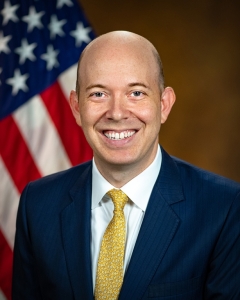The following blog post is part of a series on corporate revolvers who diminished the Biden administration’s effectiveness when it came to helping working people. Click here and here to read our full rebuttals to Matt Yglesias’ error-filled celebrations of the revolving door (which he published in Bloomberg on August 4 and on his Substack on August 12). Long story short: Joe Biden appointees with extensive ties to big business did real damage to his agenda; Democratic presidential nominee Kamala Harris should not make the same mistake.
Deputy Assistant Attorney General Brian Netter, another former (and likely future) defender of white-collar criminals, has a lengthy pro-corporate background. Netter spent a total of about twelve and a half years as an associate and partner at BigLaw firm Mayer Brown (in two separate stints from 2007 to 2010 and 2011 to 2021). During that time, he defended a litany of corporate clients, including oil giant Royal Dutch Shell, weapons manufacturer Northrop Grumman, and telecom monopolist AT&T.
At Mayer Brown, Netter defended multiple employers facing wage theft lawsuits. In one case involving a small café whose delivery drivers accused it of violating the Fair Labor Standards Act and sought damages for unpaid wages, he argued that the workers were not entitled to federal labor protections because the restaurant had not legally classified them as employees. This is the same “independent contractor” loophole that UberEats, Doordash, and PostMates exploit to subvert the rights of food delivery workers.
In addition, Netter represented Arkema in the chemical company’s successful lawsuit against the U.S. Environmental Protection Agency, which overturned parts of the agency’s cap-and-trade rules. As a result, it became harder for the EPA to reduce the emissions of hydrochlorofluorocarbons, an ozone-depleting pollutant.
As former RDP researcher Elias Alsbergas noted, Netter also used his knowledge of the 1974 Employee Retirement Income Security Act, which regulates retirement plans, “to litigate against workers and retirees who sued companies for illegally mismanaging their retirement [accounts], effectively robbing them of their savings.” Specifically, Netter “defended big corporations like Shell Oil and universities with tens of thousands of employees when they were accused of negligent handling of their workers’ retirement savings,” Elias wrote. “Netter defended Shell when it allowed its retirement plan to charge unconscionably high fees to savers and let its plan manager sell workers’ personal information.”
Furthermore, Elias added, “Netter filed an amicus curiae brief before the Supreme Court on behalf of the US Chamber of Commerce and multiple employer industry groups calling for the court to gut the ability for retirees to hold their retirement plan administrators accountable for misconduct. He later praised the Supreme Court’s ruling to weaken retirement finance regulation.”
Biden has done more to improve labor’s standing than any president since Franklin Delano Roosevelt, and he is the first to invest meaningfully in climate action. Nevertheless, it’s harder to convince workers and environmentalists that you’re fighting for them when people who have made fortunes protecting corporate interests are given prominent roles in your administration.
What’s more, Netter’s wife, Karen Dunn, is a partner at the BigLaw firm Paul, Weiss, Rifkind, Wharton & Garrison LLP, where she advocates on behalf of Big Tech. Described as “Apple’s lawyer,” Dunn has “defended Apple, Amazon, and Facebook in over ten major antitrust-related lawsuits since 2017,” according to The American Prospect. Dunn also clerked for then-Judge Garland, whom she said presided over her wedding to Netter.
While the Biden administration made the right move in selecting the neo-Brandesian Jonathan Kanter to lead the DOJ’s Antitrust Division instead of Dunn, it took a step backward in appointing Netter. Dunn is already advising Harris’ campaign, but the Democratic presidential nominee can still avoid Biden-era contradictions in her administration by ignoring Yglesias’ advice and opting to assess potential appointees’ commitment to public service rather than their proximity and fealty to corporate power.

